NARBO
Report of 8th NARBO IWRM training in Sri Lanka
Tomonobu Sugiura(ADB)
Keisuke Hatano(JWA)
![]()
1. Background of the IWRM training
From 2004, NARBO holds its training on IWRM (Integrated Water Resources Management) almost every year as a capacity building program for river basin organizations (RBOs) and government agencies. The objective of the IWRM training is to assist mid-level RBO managers and practitioners of water resources management to better apply IWRM approaches at basin-scale. Through a mix of disciplinary studies and case studies, the IWRM training helps participants develop their capacity to understand, introduce, implement and improve IWRM in their respective river basins. The 8th IWRM training was held in the Mahaweli River basin (MASL), where is the biggest basin in Sri Lanka, to enhance water security through IWRM – Mahaweli experiences.
2. Outline of the training
The 8th IWRM training was held from Nov 27th to Dec 4th 2013 at MAS Fabric Park in Thulhiriya, which is located around 65km northeast of Colombo in Sri Lanka. 27 participants, who work for RBOs or governments, came from 11 countries (Afghanistan, Bangladesh, India, Indonesia, Lao PDR, Malaysia, Nepal, Pakistan, Philippines, Sri Lanka, and Thailand), expecting to study and enhance their knowledge about IWRM through Mahaweli River basin experiences. Total 8 days’ training including 2days’ field visit (5th & 6th day) was carried out hosted by MASL. At 1st day opening ceremony was held and guests from ministry of Irrigation and water resources management, MASL and Japan embassy, some participants and secretariats lightened traditional oil lamp.
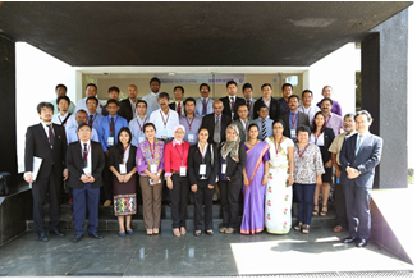 |
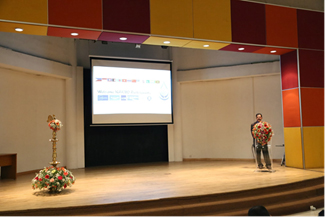 |
Participants |
Opening ceremony |
In this training many experts from MASL and other relevant institutes, and NARBO members gave lectures on not only IWRM using “IWRM Guidelines at River Basin Level” (Published by UNESCO in cooperation with NARBO) but also Mahaweli river basin’s wide variety of subjects such as irrigation, water allocation, drinking water, hydropower, ground water, environmental security, data collection as case studies. During lectures, participants were very eager to learn, actively asked a lot of questions and expressed their views on these subjects.
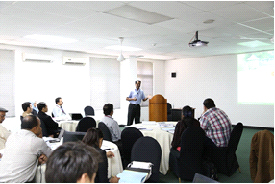 |
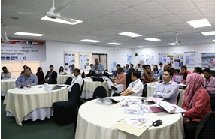 |
Scenes of lectures |
|
Participants also introduced their posters about the IWRM spiral of their basin, prepared in advance of training one by one. And they developed and revised the IWRM spiral by knowledge and information learned during training. At the last day participants made their presentations about their renewed IWRM spirals for each river basin.
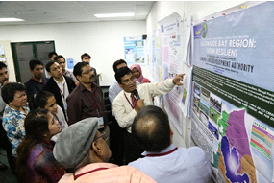 |
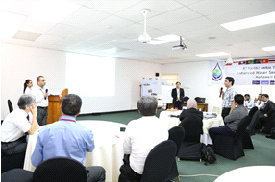 |
Scenes of lectures |
|
After the last lecture of each day, NARBO secretariat wrapped up the seminar by using clicker system to know what to get from lectures and get frank but severe evaluation about all the lectures and the training including accommodations. For example, the ratings of “what is most critical for IWRM to succeed in their river basin” were (1)38% for political will for 38%, (2)27% for capacity development, (3)19% for financial matters and (4)15% for comprehensive monitoring and evaluation. The 89% participants achieved their learning objectives and overall satisfactory rating was 100%.
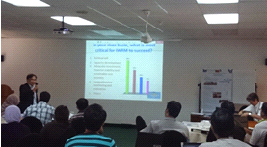 |
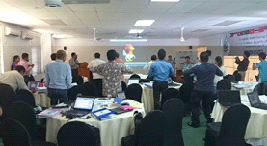 |
Wrap up |
Break time |
On the last day of the training, all the participants received a certification from NARBO.
3.Study Visit
On the first day, 30th Nov, participants visited Dambulu Oya, Kendalama and Maduru Oya. At Kandalama Reservoir and Maduru Oya Reservoir, they met with stakeholders such as farmer and fisher, and exchanged their views each other to find out “Key for success”. The second day, 1st Dec. they visited Nalanda reservoir (dam-reinforcing office), and Kandy city (Ancient capital city).
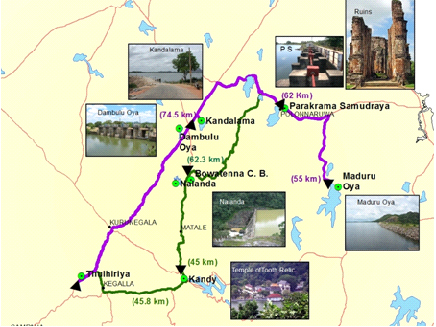 |
|
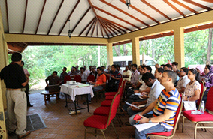 |
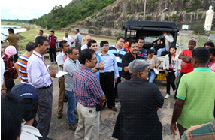 |
Study and exchange opinions with stakeholders |
|
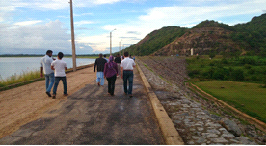 |
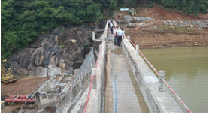 |
Maduru oya reservoir |
Nalanda reservoir |
4. Conclusion
RBOs are facing challenges on introducing IWRM to their own basin and IWRM is not yet working effectively. NARBO secretariat believes good examples or case studies in other basins help RBOs embed IWRM to their basins, and there are many good examples in Asia and Pacific region. Moreover, it is necessary to help RBOs understand “terms and conditions” of good examples to customize them for their specific challenges. NARBO secretariat expects that the IWRM training is good opportunity to start with IWRM and participants of the training get the keys to move IWRM process forward. The 7th and 8th IWRM training were held in the Mahaweli River basin. The next (9th) IWRM training will be held in other basin so that participants will be able to touch other examples of IWRM. NARBO secretariat will announce the details of the training on the NARBO Homepage soon and hopes many people will be able to join it. Finally, we would like to express our thanks to everyone related to this training, especially MASL and course directors, on behalf of NARBO secretariat.